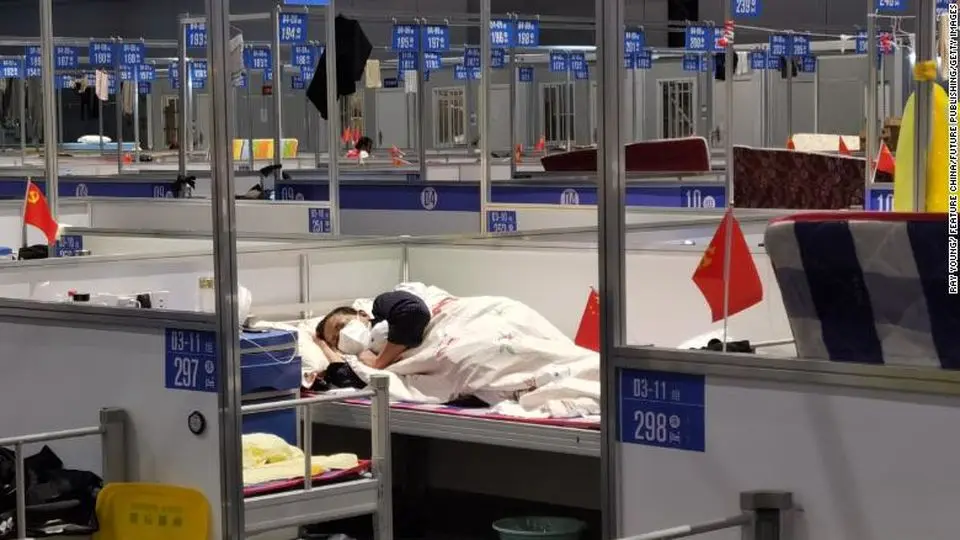Outcry as Shanghai sends vulnerable senior citizens into makeshift quarantine camps
The men came after 2 a.m. on Tuesday in the dead of the night, banging on an apartment door in a rundown housing complex in Shanghai. When nobody answered, they pried open the lock and barged in, rousing a 92-year-old woman from her bed.

CNN: The men came after 2 a.m. on Tuesday in the dead of the night, banging on an apartment door in a rundown housing complex in Shanghai. When nobody answered, they pried open the lock and barged in, rousing a 92-year-old woman from her bed.
The visitors demanded to take the woman and her 74-year-old son to a quarantine center, because, according to their records, both had tested positive for Covid-19 five days earlier on April 14. When the old woman refused to go -- both she and her son had since tested negative -- she was allegedly pulled out of bed and dragged onto the floor. Fearing the worst, her son helped her dress and agreed to comply.
The account of events, as told in a series of online posts by the woman's granddaughter Zhi Ye, a former journalist born and raised in Shanghai, has sparked shock and fury across Chinese social media.
"There's no limit to the cold-blooded cruelty and violence," said the top comment under Zhi's post on Weibo, China's Twitter-like service.
Amid public outcry, the local government issued a statement on Tuesday evening, confirming the late-night transfer of the two elderly residents to a quarantine site. It said police and neighborhood committee workers had a locksmith pry open an outer door to the apartment because they feared "an accident had happened" to its occupants.
The statement said the two elderly residents had agreed to the transfer after communicating with police officers and "voluntarily went downstairs" to get in the car.
Zhi declined to be interviewed when reached by CNN.
Zhi's grandmother is among many senior Shanghai citizens who have been hauled off to government quarantine in recent days, as authorities step up efforts to remove all positive cases from communities in a bid to end the spread of Covid outside designated sites.
On social media, some residents have called for help as their elderly parents or grandparents were taken into isolation facilities, sometimes without the medicine or equipment they need.
A patient at a quarantine center converted from a warehouse told CNN a group of senior citizens, some in wheelchairs, was transported to his facility from a nursing home on Monday night.
Some senior citizens have attempted to push back. Several social media videos show an elderly woman who appears to have left quarantine and is trying to enter a neighborhood compound. She is seen walking around and arguing with Covid workers in hazmat suits, who try to persuade her to go back to the government facility. CNN has reached out to local officials for comment about the situation, but they have not responded to calls.
The mass transfer came as Chinese Vice Premier Sun Chunlan, the most senior official in charge of the country's Covid response, vowed Monday to send anyone who tests positive for Covid and their close contacts to quarantine sites, "without exception, deduction and delay." Sun said in an interview Saturday that community transmission in Shanghai could be expected to end soon, and cases would only be detected in quarantine centers.
Shanghai officials are under tremendous pressure to contain a raging Omicron outbreak, which has infected more than 430,000 people despite weeks of stringent mandatory home lockdown. Public discontent has been mounting, with residents struggling to secure food and medical access.
The latest efforts to end community transmission have only sparked more anger. Many fear that senior citizens will not receive proper care at makeshift isolation facilities, some of which are plagued by poor conditions, overcrowding as well as shortages of medical equipment, doctors and nurses.
"For the elderly in their 80s and 90s, the risk of them getting cross-infected and dying in these quarantine centers is much higher than having them stay at home and self isolate," said Yanzhong Huang, a senior fellow for global health at the Council on Foreign Relations.
"Many of those elderly people suffer from chronic conditions that require special care, which likely won't be provided at quarantine centers."
Chinese officials have long boasted that "zero-Covid" is saving lives, especially vulnerable groups like the elderly. But some argue that by forcing senior citizens into centralized quarantine, it poses a threat to the health and well-being of the very people the policy is supposed to protect.
"The question is at what cost? And does the end justify the means?" Huang said.
آخرین اخبار News را از طریق این لینک پیگیری کنید.



